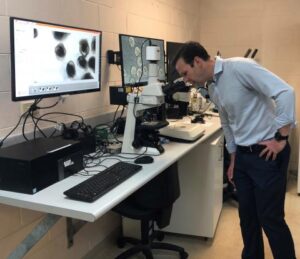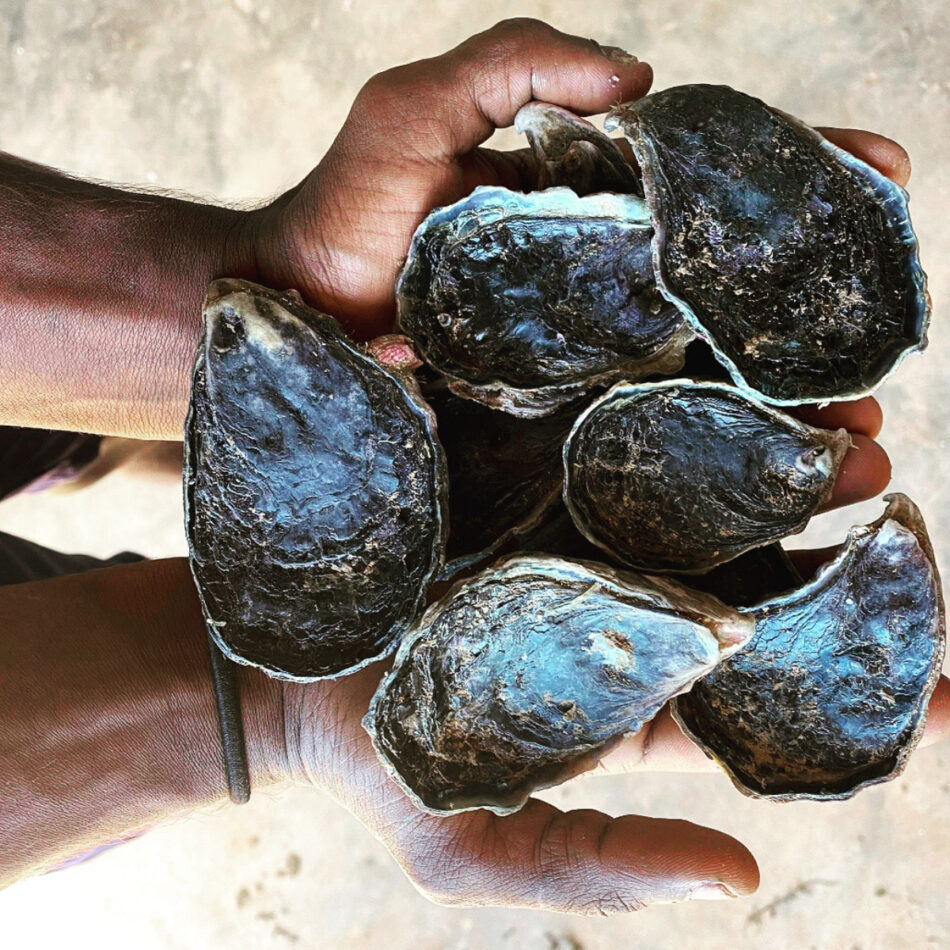A new project looking to grow northern Australia’s Tropical Rock Oyster industry has been unveiled at the Darwin Aquaculture Centre today.
Hon. Sen. Matt Canavan looking at oyster larvae at the Darwin Aquaculture Centre.
The 3-year, $4.1 million project brings together a consortium of project participants including the Northern Territory Department of Primary Industry and Resources (NTDPIR), the Western Australian Department of Primary Industry and Regional Development (WA DPIRD), industry leaders, researchers, and Indigenous stakeholders from Western Australia and the Northern Territory to develop the Tropical Rock Oyster industry in the north.
CRCNA CEO Jed Matz said the Tropical Rock Oyster (TRO) research and development project had the potential to transform northern Australia’s aquaculture sector and economy.

Hon. Sen. Matt Canavan looking at oyster
larvae at the Darwin Aquaculture Centre.
“A new TRO industry is expected to create 500 new aquaculture jobs and add more than $217 million in production value to the region over the next 20 years.
“In a truly integrated, cross-jurisdictional research collaboration, the CRCNA has brought together leading fisheries and aquaculture researchers from the NT and WA to work together and leverage their existing relationships with Traditional Owners, and commercial providers to deliver the TRO industry a roadmap to commercial viability,” he said.
Due to the complexity of the project, teams in the NT and WA will work on separate sub-projects focussing on assessing hatchery techniques, species suitability, grow-out methods, and trialling technology and equipment best suited to the northern Australian climate and conditions.
Fisheries researchers in the NT will be supported by project participants the Yagbani Aboriginal Corporation and the Anindilyakwa Land Council (ALC) at South Goulburn and Groote Eylandt (NT) respectively. In WA, the Murujuga Aboriginal Corporation will bring their traditional local knowledge of the Pilbara while Maxima Rock Oyster Company brings 30 years of pearl farming experience and assets to the research collaboration.
Matt Osborne, from the NT DPIR said the partnership with Traditional Owners is fundamental to the long term sustainability of this industry.
“We are working in partnership with Aboriginal corporations, industry and researchers to develop a new industry in Northern Australia involving local people in the trialling of farming techniques to produce a premium oyster on Country.
“The project is building on research conducted at the Darwin Aquaculture Centre and Albany Multispecies Hatchery to refine and optimise hatchery techniques to supply commercial quantities of TRO to farmers. The goal will be to deliver industry-standard (for the NT and WA) guidelines for tropical hatcheries to increase their supply of TRO spat to farmers.
“Having this consistent supply of juveniles from the hatchery and grow-out facilities is expected to increase the viability and profitability of the fledging TRO industry and provide diversification opportunities for the northern aquaculture and pearling sector,” he said.
Dr Michel Bermudes from the WA DPRID said the industry had great potential to grow.
“This project provides an exciting opportunity to work with existing shellfish farmers and companies, as well as providing opportunities for new investment in developing the industry.
We are talking about a high-quality product with plenty of space to farm it and high demand both domestically and for export,” he said.
Additional comments from Project Participants – Northern Territory
Dr Ben Diggles – DigsFish Services
“The aquaculture of Tropical Rock Oysters provides exciting new opportunities for the development of new environmentally friendly food production industries for remote and indigenous communities throughout Northern Australia. We hope to help by delivering biosecurity knowledge to minimise the potential risks to industry development from pests and diseases.”
Mr Steve Westley from Yagbani Aboriginal Corporation
“Yagbani Aboriginal Corporation is excited to be a part of this unique research program and believe it will benefit with the development and expansion of our own community-managed Black-Lip Oyster farm at Warruwi. The knowledge and support from this program will help us to open the doors to future training and local employment opportunities, and help create career pathways within the aquaculture industry.”
Additional comments from Project Participants – Western Australia
Mr John Hutton from Maxima Rock Oyster Company
“We are excited about the potential of the TRO project to develop a new industry and jobs for local people. It is a fantastic opportunity to diversify our pearling business while utilising existing assets and 30 years experience in Pearl Oyster farming.
We are looking forward to exploring potential new markets and growing the business from our base in Northern WA.”
Mr Peter Jefferies from Murujuga Aboriginal Corporation
“The rock oyster project is fully aligned with our strategic priorities of diversifying our income stream and creating ‘on country’ jobs, and will complement our proposed $40 million tourism facility located in the Murujuga National Park – an area which has recently been put forward for World Heritage Listing .”
Mr Peter Boyle and Mr Stirling Cullenward from ZAPCO Aquaculture
“Zapco Aquaculture has been pleased to be involved with the early-stage development of the Tropical Rock Oyster industry and looks forward to providing ongoing support through trials of our diverse range of aquaculture equipment.
The CRCNA has and can continue to draw on our knowledge and expertise from our team of rock oyster farmers and manufacturing engineers to help establish best practice for this emerging industry. Our commitment to this partnership meshed with all other stakeholders resources is an important cog in the wheel assisting in successful outcomes.
Zapco recognises the importance of patient and precise trials of species, locations, equipment and farming techniques to establish and sustain this potential oyster industry for the long term future. With this in mind, we are excited to continue to be part of the project and see the steady evolution of the TRO industry.”
Mr Alex Jack from SEAPA
“SEAPA is excited to be involved in the TRO project and sees huge potential for the establishment of an industry that can support local communities into the future. Close alignment with different oyster industries around the world is a core element of SEAPA’s strategy, so we welcomed the opportunity to support this project in northern Australia.
The knowledge and expertise that will be developed through the TRO project will no doubt stand the industry in good stead for many years to come.”
Media enquiries
Carla Keith, CRCNA Communications Manager 0499 300 051


